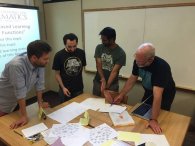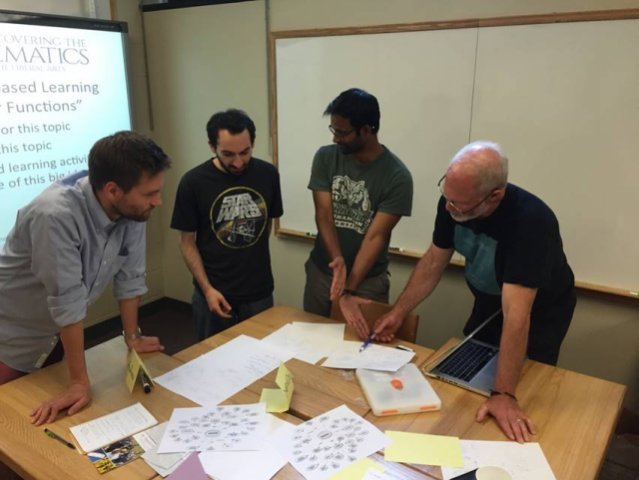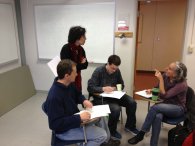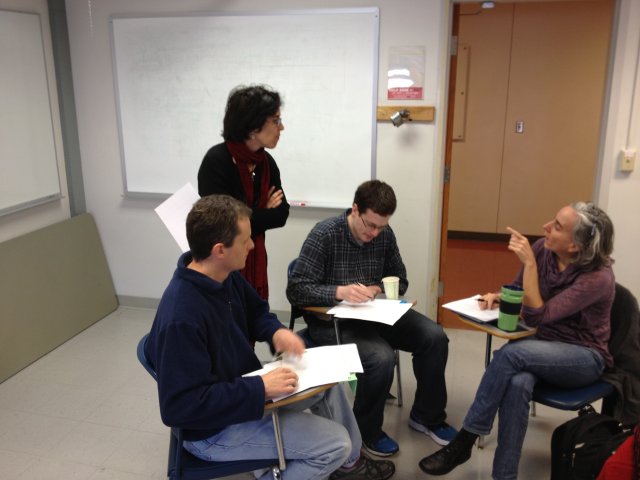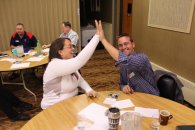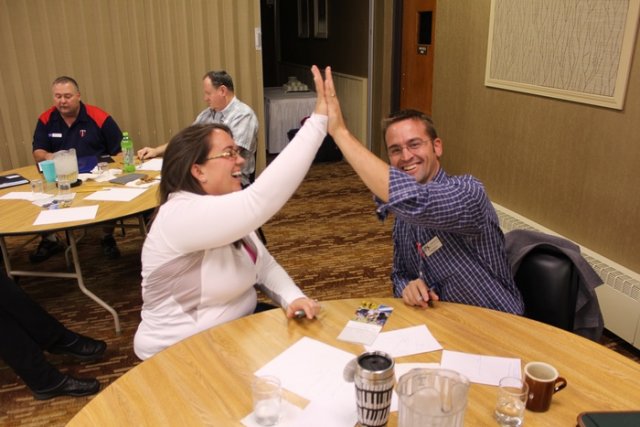Workshop Vignette
Written by: Dr. Christine von Renesse
Guiding Principles
I believe that one learns best using inquiry. Therefore the guiding principle of our workshops is to not lecture about how to teach using inquiry but to facilitate activities what will lead the participants to discover the teaching ideas themselves. As part of our activities we let participants experience what it feels like to learn inquiry-based as students. Participants report regularly how eye opening this activity was for them and how much it motivated them to change their own teaching style. We also let participants practice their teacher moves with the other workshop members, as in the following workshop vignette. We usually use mathematical activities from our books since they are often (hopefully) new to all participants. As long as the topic is approached via inquiry the specific content is not relevant for our purpose. The teacher moves that the participants engage with can be used with any mathematical topic.
Unfortunately we don't have video clips from most of our workshops, so we invite you to read the following vignette instead:
Workshop Vignette
We just watched several classroom video clips to see how teachers use “talk moves” to facilitate a good discussion. The 10 workshop participants (high school teachers and professors from 2 and 4 year colleges) described the teacher moves they observed, which include the talk moves from Susan Chapin’s book Math Talk (Chapin 2003):
- Revoicing: Facilitator rephrases what he/she heard the student say
- Rephrasing: Let a student repeat what another student said
- Agree or Disagree and Why: Ask the class whether they agree or disagree with a statement
- Adding On: Invite students to add any observations, thoughts or questions
- Wait Time: Do nothing for at least 10 seconds, the hardest thing to do for most teachers.
- Sharing: Decide who gets to share their ideas (and when)
- Record: Write/represent the essence of the discussion on the board
Some of the participants look a bit nervous since they know they will soon lead a discussion using talk moves in our group. I explain the goal of the role-playing: “This is your chance to practice facilitating a discussion in a space where it doesn’t matter when we mess up. There are no students here; we are not trying to cover anything. Just see what it feels like.” The first facilitator, Professor G, hands his problem to the groups of “students.” They are supposed to decide if $0.999.…=1$ or not. While he walks between the groups I notice that he seems to “hover” over the groups with his arms crossed. I join him and suggest that he can just pull up a chair to a group and tell them that he is just “listening in.” This little meta-conversation doesn’t distract the groups from playing with different proofs for different audiences. I observe that a few participants argue against the equality but are quickly shut down by their group members.
After 10 minutes of group work Professor G calls his “students” together. He decides to start with a group that uses the trick of multiplying $x=0.999…$ by 10 so that $10x-x=9.9999… -0.999…=9$ which makes $x=1.$ After they explain their idea he asks another participant to repeat their thinking. The next group uses a calculus approach with a geometric series.
As they take over the board I wonder how the participants are doing that don’t believe in the equality. Did Professor G. notice that they are there? Does he have a plan to bring them in? It seems to me that he will continue to let the groups share their thinking without connecting the ideas or bringing in disagreement. So I decide to interrupt him and address the group: “We have heard a lot of arguments in favor of equality. I wonder if there is anyone in this room who thinks 0.999… and 1 cannot be equal?”
One participant immediately raises his hand to share that it doesn’t feel right to him that these numbers could really be equal. “It just can never reach 1, something with the algebra must be wrong. Maybe we can’t subtract the infinitely many places the way we did?“ Now the energy rises in the room and a member of the first group starts to defend her algebraic thinking. Professor G. is busy recording their thinking and calls on a third group to repeat where the conflict lies.
When our allotted time for the discussion is over it is hard for me to get the participants to stop discussing the mathematics: “Take a deep breath, let go of the mathematics, and put your teacher hats back on.” Pause “Thank you. Professor G., how did the discussion feel to you?” He shares that it was hard not to tell the “students” who was right and to let the conflict develop. His gut feeling was to call on the students who knew the correct answer and avoid the students who seemed to struggle. The question comes up when to step in and give feedback? Can we agree to disagree? Do we need to come to a conclusion before “class is over”?
The discussion touches on many important aspects and challenges of an inquiry-based classroom and I try not to tell the participants how I would deal with this situation. After all, this is their moment to inquire about teaching, and not mine.
We are also using classroom videos in our workshops, to let participants observe and analyse student learning and teacher moves. Our favorite videos involve Mathematical Conversations.
Workshop Evaluation
We are currently using pre and post evaluations for our short workshops to measure the impact right after a workshop and a year later. Results are not compiled yet. Comments on our post surveys suggest that our workshops are well received. Conversations with department chairs in the year after a traveling workshop indicate that participants use our ideas to change their class structure, and work on their teaching moves. Written comments from workshop participants include:
"I believe the most effective aspect [of the workshop] was experiencing IBL as a student and unpacking what it is like as the facilitator. I think it gave me a real sense of what kinds of activities to utilize with my students."
Workshop Participant, 2016"[The most effective parts of the workshop were] explicitly looking at and practicing the teaching moves with a group of eager learners before I try it with my reluctant students."
Workshop Participant, 2016"This workshop exceeded my expectations. With a post-secondary focus, I expected a more typical 'quick fix' message. I felt the work we experienced here is much more fully and authentically aligned with current education research than any post-secondary PD I have ever experienced."
Workshop Participant, 2015

